High Tide interview
One of the most important underground rock bands from Britain. Formed in 1969 by Tony Hill (guitar and vocals), Simon House (violin and keyboards), Peter Pavli (bass guitar) and Roger Hadden (drums).
Interview with Peter Pavli
Would you like to talk a bit about your background? Where and when did you grow up? Was music a big part of your family life?
Peter Pavli: I grew up in London, after coming here from Cyprus around 1950 as a baby. My family were Greek Cypriot so the music that was played in the house was all Cypriot stuff, which I wasn’t really interested in at the time, though I did get more interested in it later in life because of the odd tempos, like 5/4 and 7/8, even 9/8.
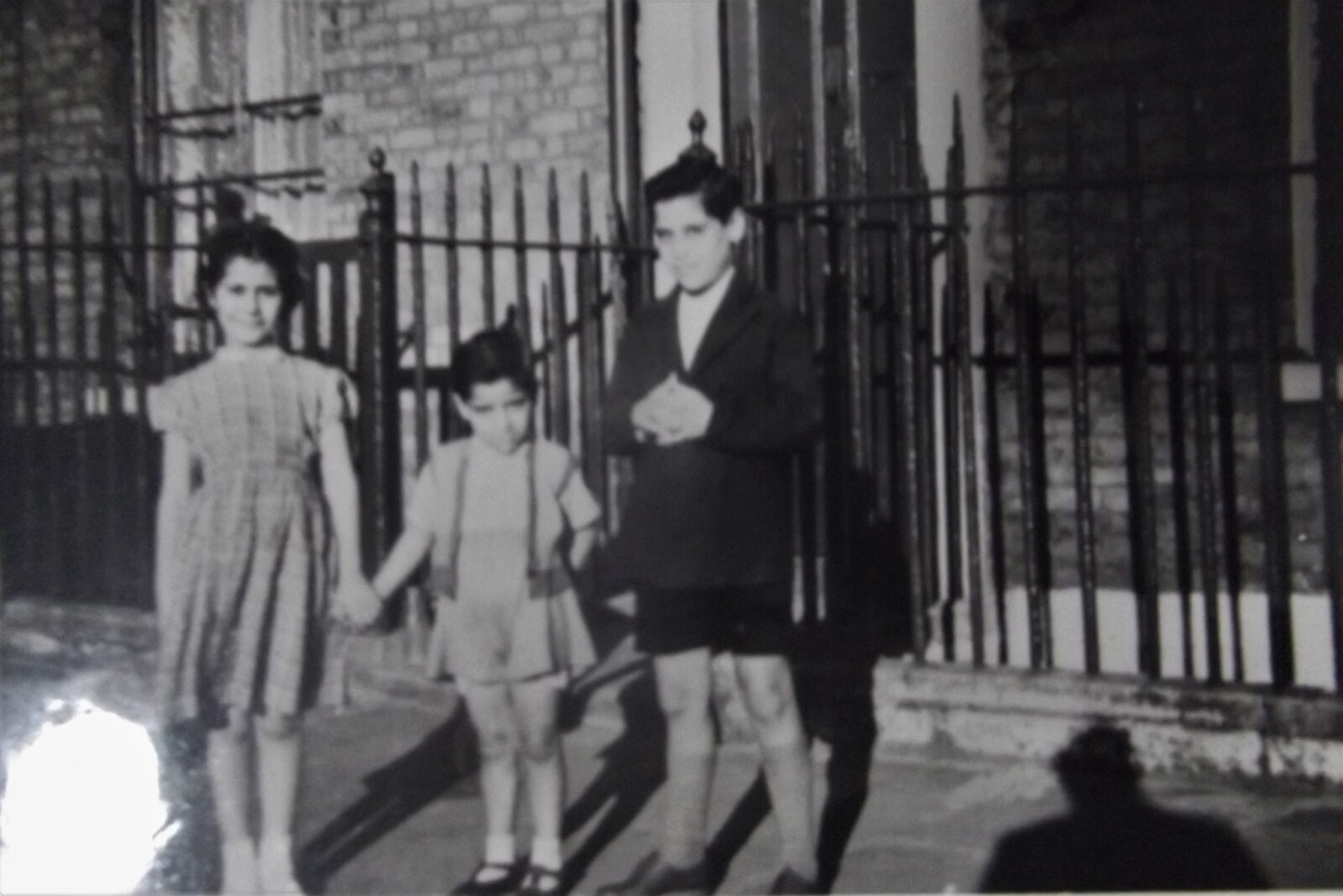
When did you begin playing music? What was your first instrument? Who were your major influences?
I began playing and thinking about being a musician in my early teens when I started listening to pop music a lot more. Me and a few friends used to listen to the chart shows on radio and later, to Top of the Pops on tv. Electric guitars were expensive at that time in the early 60s and they were often big, bulky semi-acoustic things, not great looking, but still way out of reach for us. I think the big change came when we saw The Shadows, the biggest guitar band in the UK, come on stage with the first Fender Stratocasters, bright red objects of beauty, looking like something from the future. Every wannabe rock guitarist in the country wanted one of those. The Shadows were my first major influence with their twangy, reverb sound, quite heavy really for the time. We had to content ourselves with cheap acoustic guitars with gut strings, which sounded nothing like electric guitars, but at least gave us the beginnings of technique. We learnt a few chords and lead lines and that was a start. The early influences were blues, soul and R&B, the soul and funk stuff especially having great bass lines.The major influences were of course, bands like The Beatles, The Stones, The Kinks etc. It was a fantastic period for guitar based bands. Later of course we were listening to bands like Captain Beefheart, Frank Zappa, Velvet Underground, The Doors, etc. As far as bass playing was concerned, I’d started, like most kids, with an acoustic guitar, and copying the big bands of the time. Playing with like-minded friends, there comes the point when you all have to decide who’s playing what. I couldn’t play chords very well, so that was rhythm guitar out; I was ok at lead lines but one of our group had just acquired an electric guitar and an amp, so that automatically made him lead guitarist. Which left me playing bass, reluctantly at first, but once I’d bought my first electric bass guitar and started practising, I was hooked. You soon realise that the bass is the powerhouse and movement of any band, along with the drummer, so I was happy.
When did you decide that you wanted to start writing and performing your own music? What brought that about for you?
I’d always liked making up riffs and melodic lines so I was doing that in my head anyway, but when multi-tracking tape machines arrived that’s when you could start putting stuff down. I didn’t sing so most things were instrumentals, usually 5 or 6 lines multi-tracked. The 4 tracks I worked on with Bob Calvert which later became the ep Revenge, started as instrumentals, then when Calvert heard them he liked them so much that he went away and wrote lyrics for them. He came back to my house a couple of days later and we recorded the vocals with the music tracks. They sounded great, with potential for going into the studio later to record them properly. Unfortunately we never managed to do this as we got sidetracked with other work, and the 4 tracks weren’t released until 10 years later after he’d sadly died. So the tracks remained in demo stage.
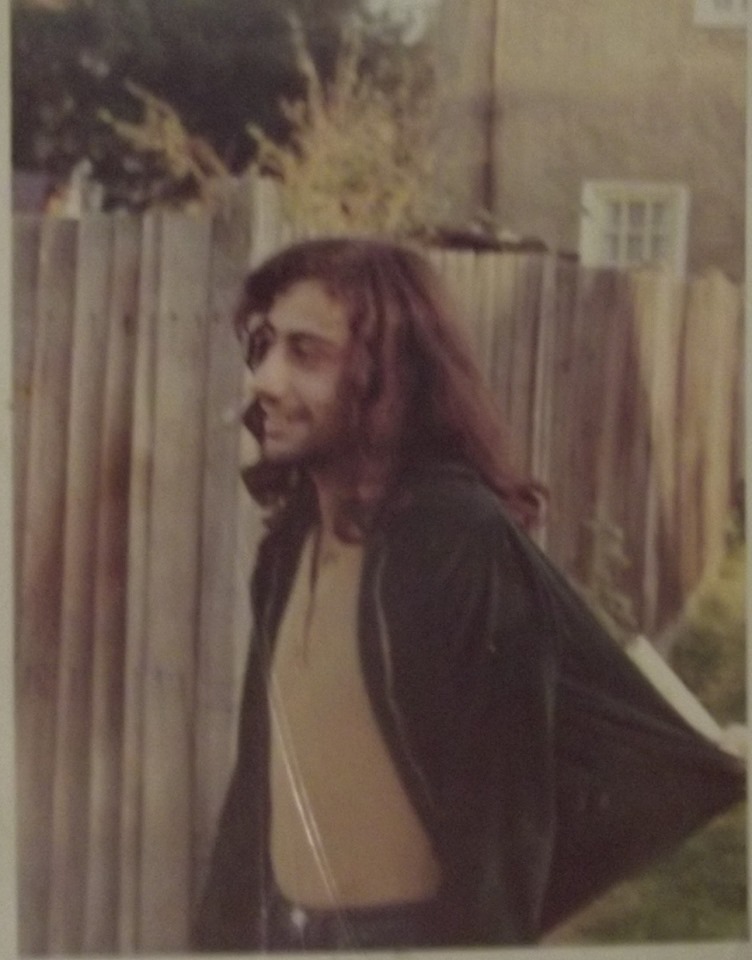
In 1968 you joined White Rabbit. What can you tell me about its members? What do you remember from the time you played in this band?
I don’t remember too much about this period, mainly because we were all smoking and drinking a lot, so it all becomes a bit vague and dream-like. It was our first foreign residency gig so we had a great time. We were in Juan Le-Pains in the south of France, the management had given us our own little villa where we slept and hung out, but the playing regime was brutal. We did about half a dozen sets every night, starting around 9/10 in the evening, playing for three quarters of an hour, then a 15 minute break, then another three quarters of an hour, and so on throughout the night. We’d then stagger back to the villa at dawn, have a final joint and collapse into bed. That was the routine every night. I remember that Andy Rickell was on guitar, there was a girl singer plus Rod Goodway, then a weird guy on organ, and a drummer, who I’ve forgotten. It was a hilarious, stoned, drunken week, and the final joke, on us, was the day we left, we needed to score a little pot to take on the journey. Some French guy was lurking outside our villa and offered to meet one of us and sell us some weed. So we met him behind some shed and he gave us a matchbox full of some green stuff and we gave him 50 francs. It wasn’t until we were on the road and rolled up the first joint that we discovered that the matchbox was full of dried seaweed. It’s funny now, but wasn’t then.
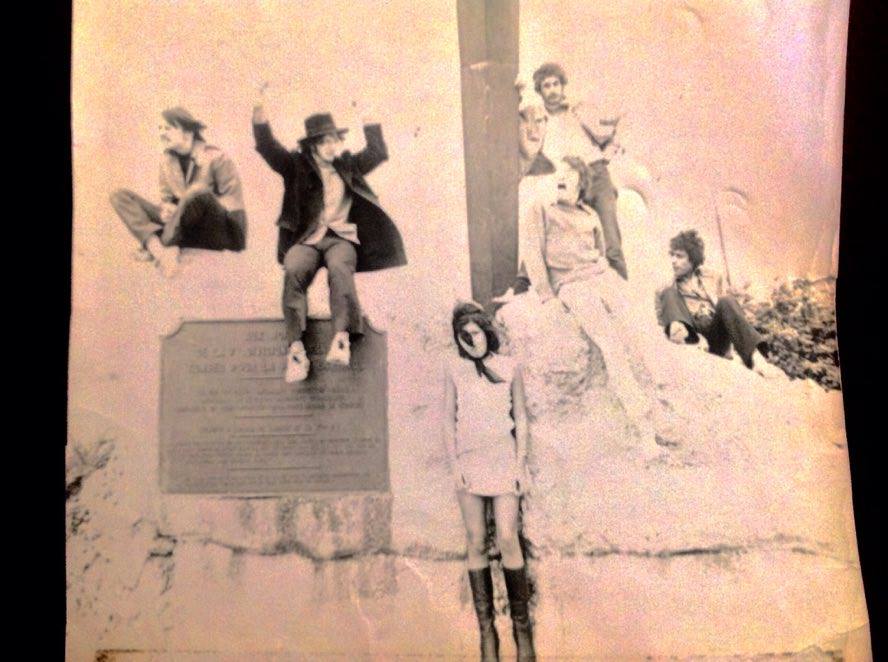
“Beefheart asked me why, I said that I had no money, (I was joking; I don’t remember why I wasn’t wearing shoes but it wasn’t because I had no money).”
Adrian Shaw told me a very funny story! Another remarkable gig, back in London, was at Middle Earth supporting the wondrous Captain Beefheart and his Magic Band. And, after melting our minds with a totally far out set, it was Don, the Captain himself, who came over and complimented US on our set! It was then he noticed that Pete Pavli (still) wasn’t wearing any shoes! I’ve told this story a few times but it bears repeating that the good Captain sternly (but good naturally) rebuked Pete, warning him of the health issues of barefoot living … But then, astoundingly, he handed over a £5 note and told Pete to buy a new pair of shoes! “Don’t just spend it on dope, man. Get yourself some footwear!” What a beautiful man. (p.s. It was spent on dope)
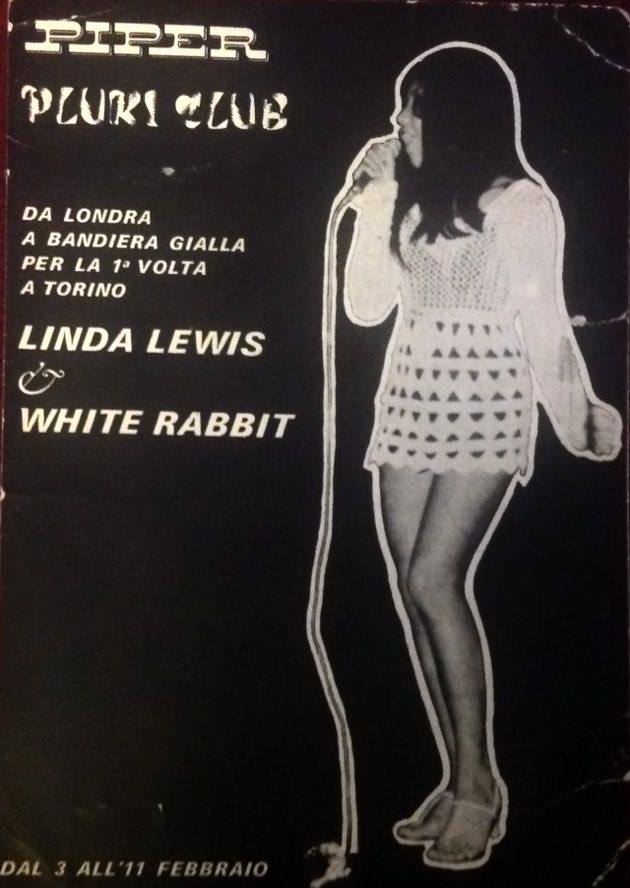
What was that about, haha? Well, this is almost true except some of the facts are wrong. Yes, we did bump into Beefheart in the west end of London, we stopped to talk to him and he noticed that I was not wearing shoes. He asked me why, I said that I had no money, (I was joking; I don’t remember why I wasn’t wearing shoes but it wasn’t because I had no money). He appeared astonished and pulled out a 5 pound note and offered it to me. I said no, it’s ok, but he insisted, thrust it into my hand and he did say I hope you don’t spend this on dope. I assured him I wouldn’t, (I did), thanked him profusely and we parted company with us all thinking what a great bloke he was. Ade Shaw says that it wasn’t the roundhouse, and that Beefheart didn’t come over to compliment Magic Muscle on their set, so I don’t know where that bit of the story came from. Never mind, it’s a great story and shows Beefheart in a kindly and generous light.
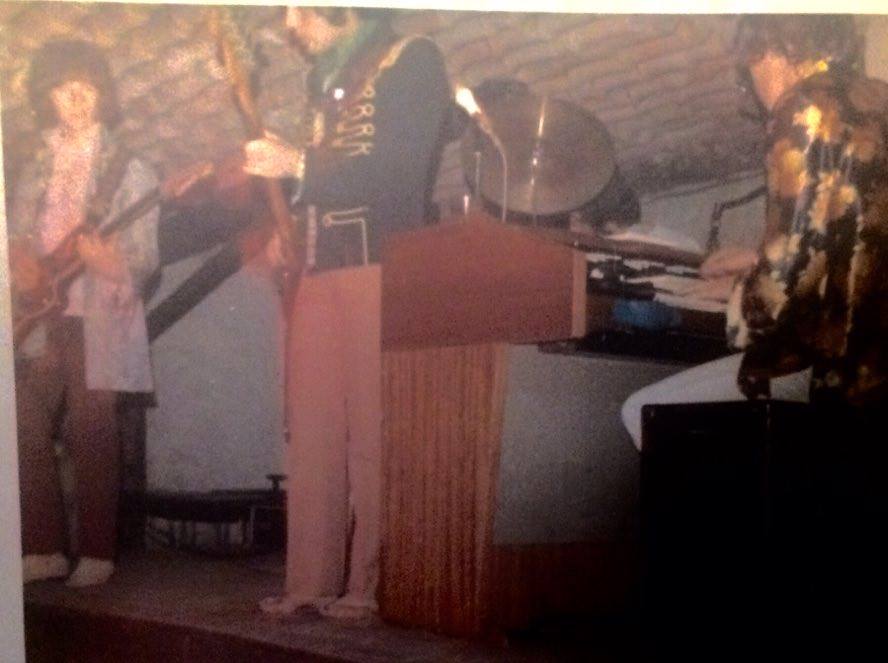
What bands were you a member of prior to White Rabbit? Any recordings or releases by them?
I was in a couple of semi-pro band from the time I was about 18 to 21… one was a band of two brothers who lived round the corner from me in Tottenham, North London. We specialised in blues and soul music, from singers like Otis Redding, Sam & Dave, Howlin’ Wolf etc. Great practise for my soul/funk technique. No recordings exist, I think. The other band I can’t even remember their name, but it was similar music. Again, no recordings. I think my music career took off properly from High Tide onwards.
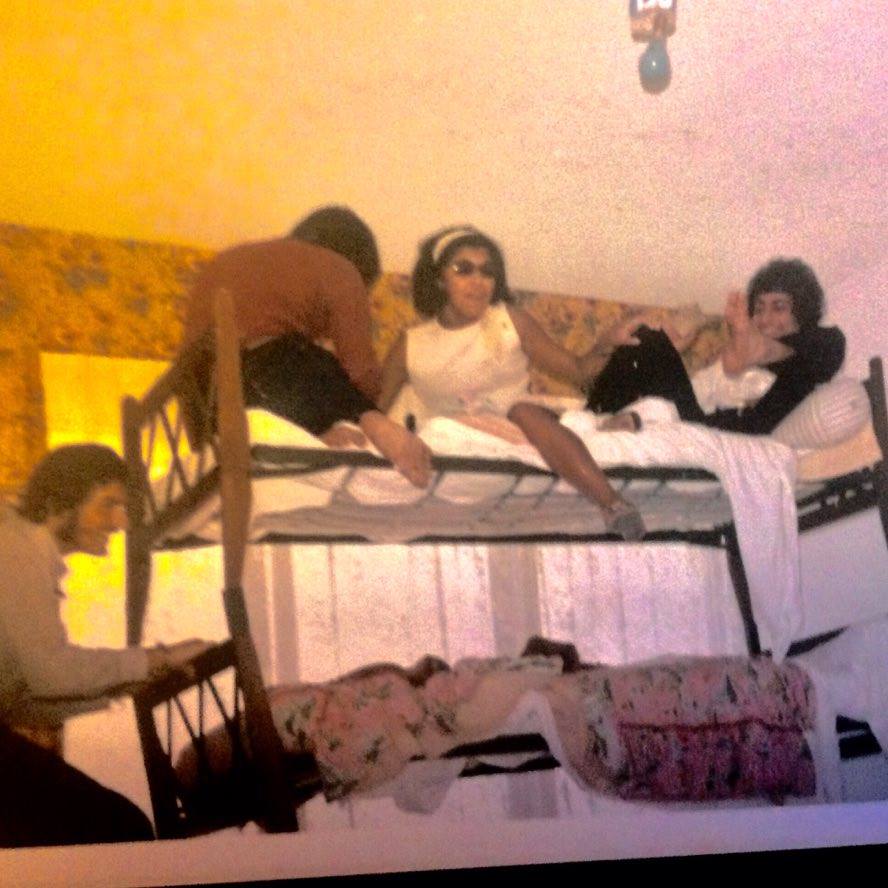
Left-to-right: Ron Berg (climbing); Rod Goodway (back to camera); Linda Lewis and Pete Pavli.
“We just smoked a joint together then had this amazing jam which seemed to go on for hours.”
Can you elaborate the formation of High Tide?
Again, I don’t know how the other members met, I just remember that someone told me that this band wanted a bass player, so I turned up for an audition and met Tony Hill, Simon House and Roger Hadden for the first time. I did think it was one of the strangest auditions I’d been to because there wasn’t much said, we just smoked a joint together then had this amazing jam which seemed to go on for hours. When the jam ended, we had another joint and then Tony said, quite casually, that there was a gig on Friday, somewhere in London, don’t remember where, and that was that. We must have rehearsed before then but that’s disappeared from my memory too. Anyway, from that point, I was in the band. Great.
You met at Ian Samwell’s party and just started jamming?
I don’t remember that, but I did know Samwell as he managed White Rabbit, and was also dating the singer Linda Lewis who was in the band when we went to France.
How did you decide to use the name ‘High Tide’?
I wasn’t around when the name was chosen. I think it was Tony’s idea.
When and where did High Tide play their first gig?
As I said, I think it was the same week that I did the audition with them, but it may have been a little later to give us time to rehearse. I think the first gig was at Porchester Hall in London, where we also first met Hawkwind, who were not called Hawkwind then as they’d just formed. They called themselves Band X, and they borrowed some of our equipment to play this their first gig. Quite a historic day, actually.
Do you remember the first song the band played? How was the band accepted by the audience?
It may well have been “Death Warmed Up”, one of the favourite numbers, and one that always got the audience jumping around. I do remember that the band was always well received, even though we didn’t jump around or have a ‘stage act’, we did play at incredible volume, and I remember that wall of sound was truly amazing. I’d never played that loud before but, with the complex music arrangements, it was an astonishing experience.
What sort of venues did High Tide play early on?
All kinds. We played clubs like the Marquee, the Roundhouse etc, as well as colleges all over the country.
“I think the band’s sound was pretty unique because of the combination of Simon’s violin and Tony’s guitar”
What influenced the band’s sound?
I think we were all influenced by similar music, which is probably why we worked so well together. We listened to a lot of contemporary bands like The Doors, Jefferson Airplane, Jethro Tull, Spirit, Family, Beefheart, Zappa, etc. But I think the band’s sound was pretty unique because of the combination of Simon’s violin and Tony’s guitar, playing fast Bach-like runs and progressions and hard rock rhythms, each of them soloing, with the drums and bass keeping the whole massive edifice grounded and thundering along. I don’t think any other band had that combination of sound. And of course Tony Hill’s songwriting was complex and rhythmic, the melodies were unusual. Like other good bands I think it’s that lucky combination of people and ideas.
What’s the story behind Sea Shanties album? Where did you record it? What kind of equipment did you use?
Again, these are questions mostly lost in the mists of time as far as I’m concerned. Tony wrote all the songs on this album, and the usual method of rehearsing was that he would play the song through on guitar with vocals, then we would all begin to work out our various parts, writing down chords, rhythms, stops and starts, and the songs would gradually take shape with everyone working on their own parts. Sea Shanties had no particular theme, it was just a collection of songs. When we went into the studio the idea was to try to get a live sound by having all the amps together as if for a gig, then the whole thing miked up to capture the band as a whole rather than recording individual instruments. I think we all had Hi-Watt 4×4 cabinets and 200 watt amps. I think that arrangement was why the sound of the album is unusual.
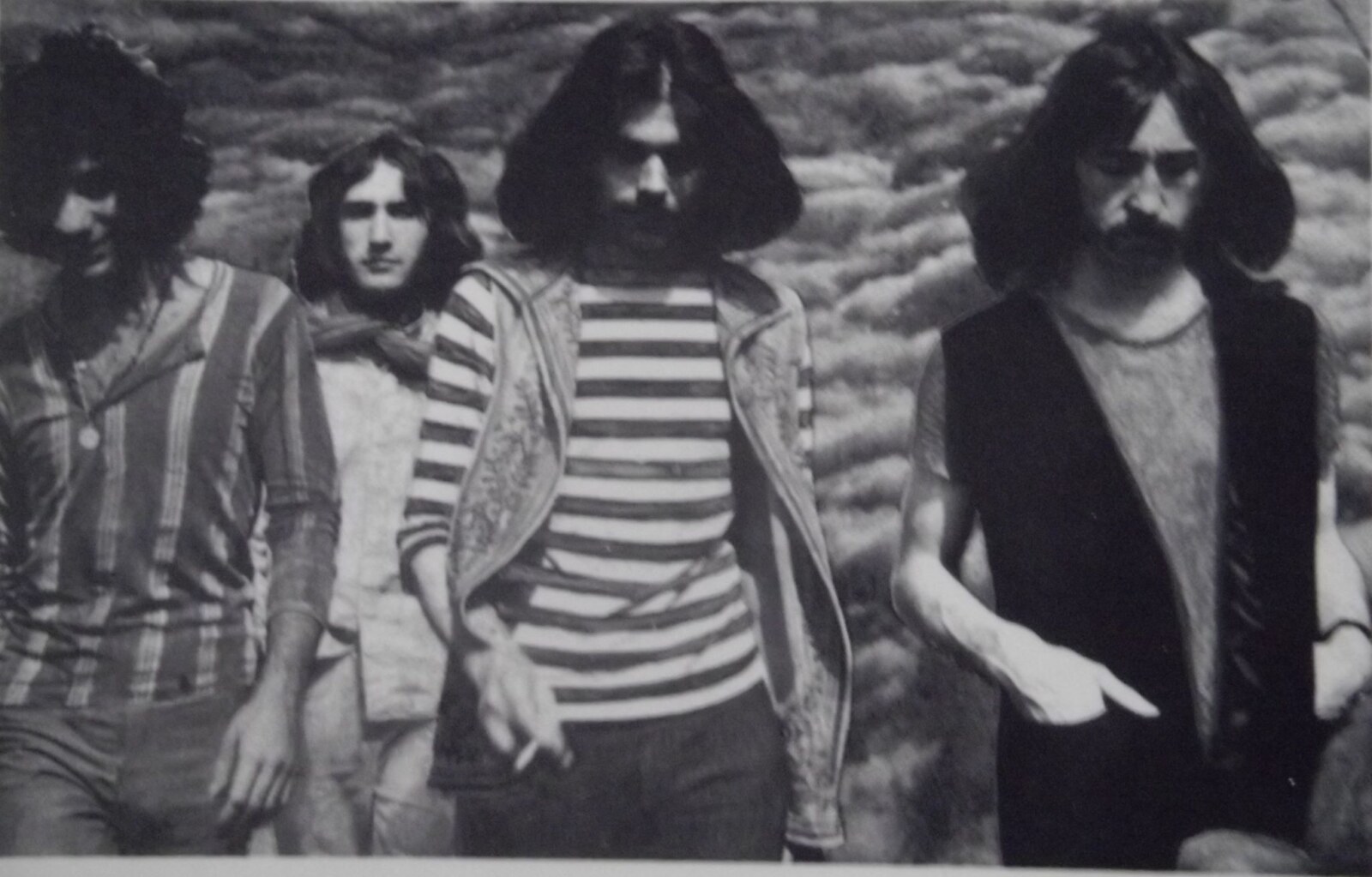
How many copies were produced? Who was the producer?
I don’t know how many copies were produced, but the producer was our friend Denny Gerrard whose album Sinister Morning we played on later.
Please share your recollections of the sessions. How many hours did you spend in the studio?
I don’t have any recollections of the sessions, (it was a very long time ago), or how long it took to record.
What were the influences and inspirations for the songs recorded? Would you share your insight on the albums’ tracks?
You’d have to ask Tony about that.
What can you tell us about the cover artwork?
I don’t know whose idea that was; I’m guessing it may have been Tony.
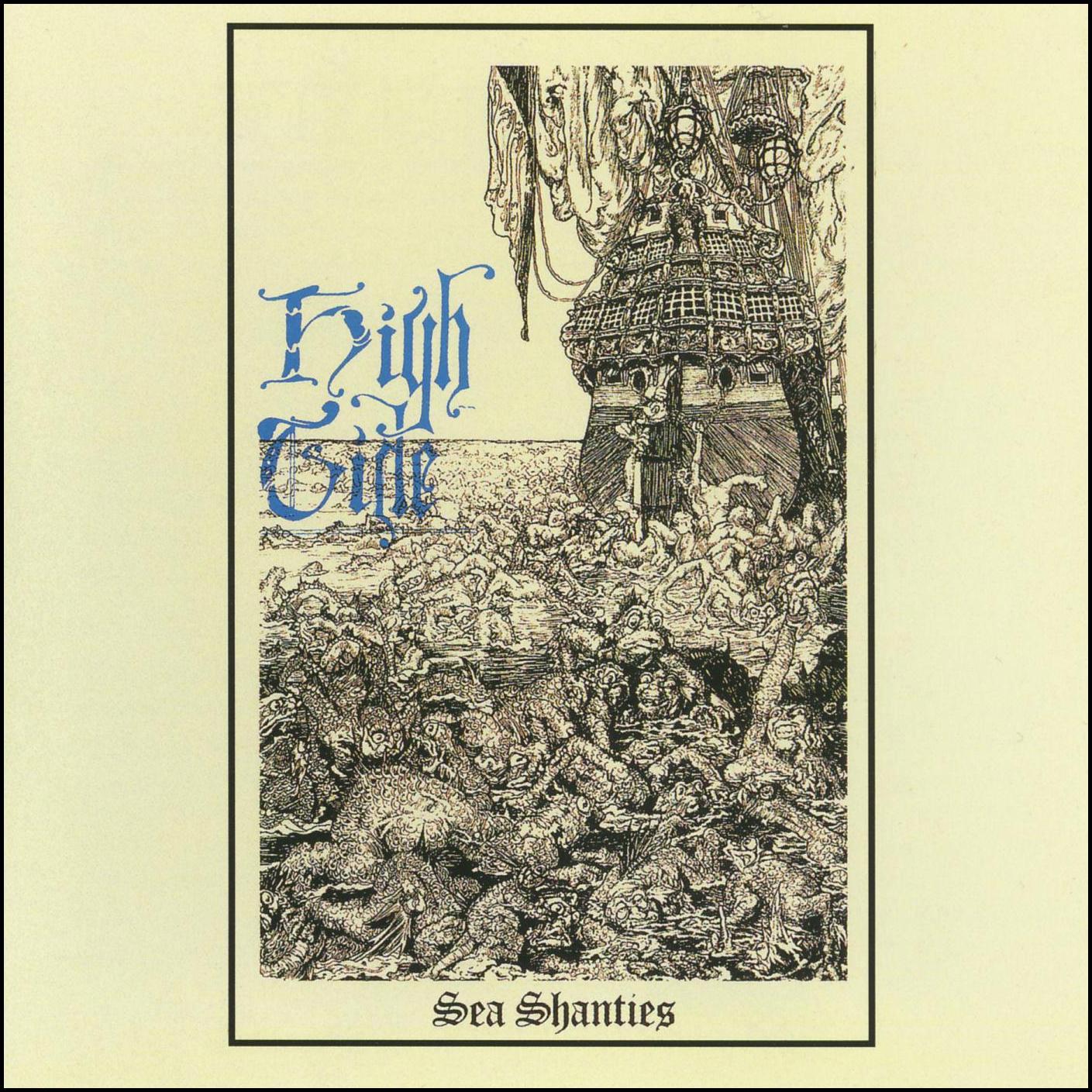
Were you inspired by psychoactive substances like LSD at the time of writing the album?
We had all taken LSD but not while we were recording. We mainly smoked during the recordings.
How pleased was the band with the sound of the album?
I think we were all very pleased with the album. It was the first time we’d heard ourselves playing as a band and that was an interesting experience. When you’re on stage you are concentrating on the music and you’re in the zone completely. Listening to the album was a very objective experience, and it made me realise what a great band High Tide was. And yes, it was very heavy.
What, if anything, would you like to have been different from the finished product?
Nothing.
Did the size of audiences increase following the release of your debut?
Yes, it probably did. I think our label did a good job of promotion and the album was played and reviewed and gave us a bigger and quite dedicated audience. However, not everyone was a big fan. I still remember one music paper, Melody Maker I think, reviewing the album with this very short, and actually quite funny sentence. ‘High Tide, low ebb.’ Quite crushing. Most other reviews were more favourable and like most bands in those days our reputation grew through our live gigs which then produced the record sales.
How did you get signed to Liberty Records? Roger Hadden, your drummer was working with the label, right?
Again, this information is lost in the mists of time. I do remember that we had a very good relationship with the label, and often dropped in to speak to Peter Lord, our main go-between, who would sort out any problems, made sure we got paid, had equipment etc. A very decent man. It may have been that Peter Lord came to see us at a gig, liked the band, and offered us a contract. That was quite often the way. Yes, Roger was working for Liberty, but luckily for us, we managed to recruit him for our drummer. He was a very talented drummer, and fitted the band perfectly.
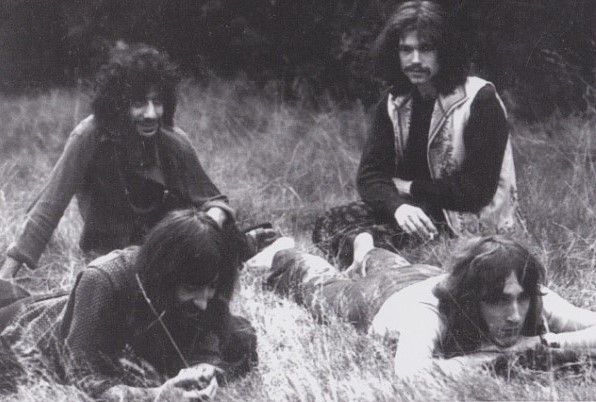
How would you describe your sound?
Extraordinary. I think that combination of electric violin and guitar playing those crazy, fast runs and riffs together was very original, no other band sounded like that, plus the addition of a thundering bass and drums combo keeping the whole thing moving. Speaking for myself, I had to up my game when I joined High Tide. I was a pretty good bass player at that point, but I had never played music as complicated as that before, and in-between rehearsals I spent several hours each day practising my bass playing, working on my technique. I think that was the point when I became a serious player. I would say that was true for all of us, and mainly due to the influence of Tony Hill.
Tony Hill plays his instrument in a very unique way.
He is an amazing guitarist, very fast and able to produce those screaming phrases that were so unique in the sound of the band. How he developed that technique I have no idea.
Originally, Simon House played bass, but in High Tide turned to violin.
Again, I didn’t know the band then and don’t know why he moved from bass to violin.
Give us some insights on developing your bass technique.
As I said earlier, I had to practise seriously for hours every day when I joined High Tide, just to keep up with the lead instruments of Tony and Simon. I had no other bass players that I was influenced by, I was completely immersed in the band’s sound and my playing technique developed from that. I think my earlier influences of soul, r&b and blues stood me in good stead, and worked well within the structures of the band music. I just had to play a lot faster.
A year later your self-titled album was released. How would you compare it to Sea Shanties? Was it record it in the same studio? It sounds a bit differently.
I would say it was a further development from Sea Shanties as far as the bands writing was concerned. There was a more concentrated feel to the music, longer sections, more experiment with sound, and it was recorded in a more conventional manner, with all the instruments separately miked and recorded rather than the live gig technique of Sea Shanties. I think there were more overdubs too. It was in a different studio, and I think we were aiming for a cleaner, sharper sound. Again I can’t remember any more details than that. For myself, I think I prefer Sea Shanties just for the sheer exuberance of the playing and that wall of sound that we achieved. But I think the second album did show the progression of the band over the period of a year.
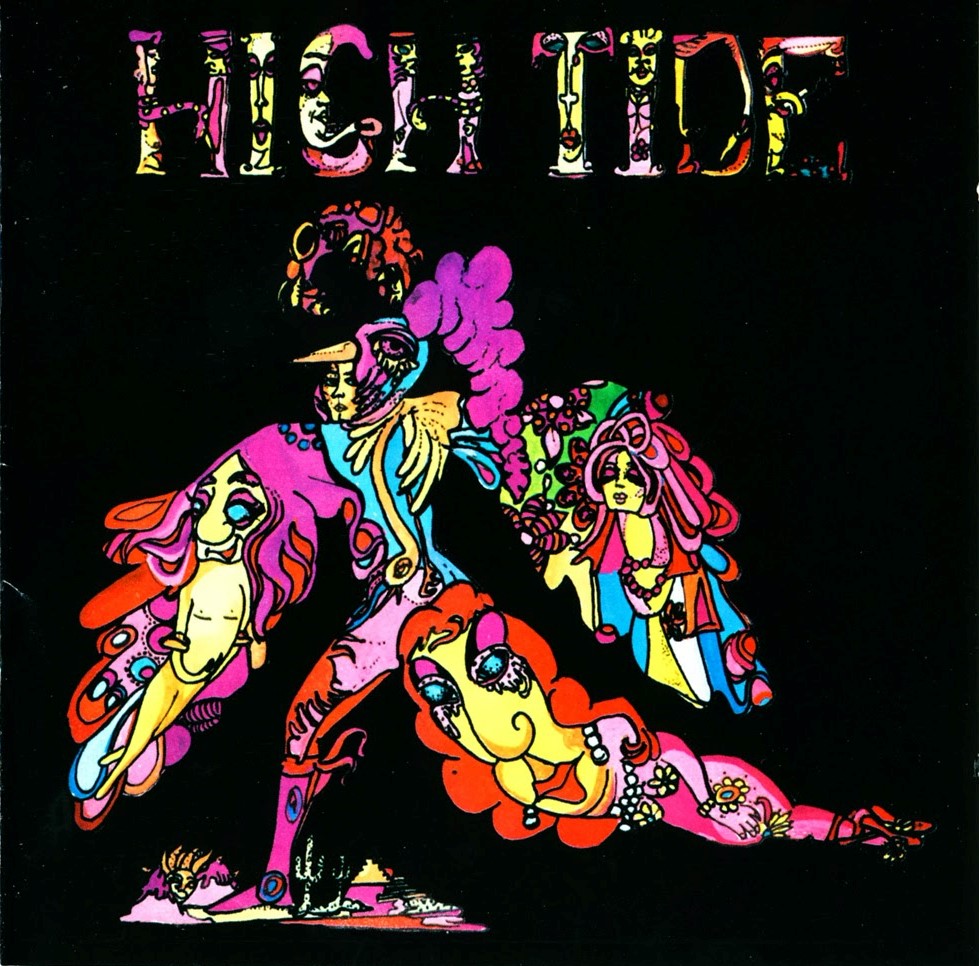
“Tony (Hill) had a call from Bowie asking if we could all go over to his house and help out with some new songs he was working on.”
Blind Faith’s bassist Rich Gretch was listening to your sessions. He was recording in other studio and playing violin.
Sorry, I know nothing about this.
But I can tell you an interesting story about our day with David Bowie. You may not know this but Tony Hill was in a band with Bowie many years before; I think it was quite a folky type band with a girl singer. I can’t remember the name of the band. Anyway, when we were based in London, Tony had a call from Bowie asking if we could all go over to his house and help out with some new songs he was working on. Bowie was pretty famous at this point but not the huge fame of a couple of years on. We all said yeah, great, and went over to Bowie’s house, I think in west London. We were greeted with great friendliness by Bowie who immediately started rolling these mammoth joints about a foot long. He had a recording setup in his house and he played us 3 or 4 songs and we started working on them. We spent all day there, recorded these songs in the afternoon in a very stoned session, with Angie, Bowie’s wife dropping in with tea and sandwiches. At the end of the day we had about 4 good demos on tape, and Bowie seemed very happy. We’d had a great day, with a lot of joking and laughter, and parted on very friendly terms. The album that Bowie was working on with us came out later as Hunky Dory.
You were managed by Clearwater Productions who also managed Hawkwind, Cochise and Skin Alley.
Yes, I think we were generally happy with them. We had plenty of gigs at that time, and we had become well-known on the circuit so I don’t remember any serious complaints. Clearwater was actually made up of the four managers of the various bands; our manager, Wayne Bardell worked with Doug Smith, who managed Hawkwind, and so on.
At the time you lived in Abbey Road?
Yes, I shared a flat with a couple of the band, the single members. Tony was married at that time so he lived with his wife, as did Roger. Great fun. We all got together once a week to rehearse but there were one or two gigs every week, so we were always busy.
But you moved out of London and lived in an old house, right next to Rustic Hinge & The Provincial Swimmer and you often visited them as Rustic Rod Goodway recalls.
The fashion started that bands began to move out of London and live and work together in farmhouses out in the countryside. So that’s what we did. We moved into a cottage called Norris Mill, a mile up the road from a farm house which had been taken by the Arthur Brown Band. Then they broke up and left, leaving Andy Rickell, Drachen Theaker and Andy’s wife Pat and a tech friend they called Boob, (real name Ian). We had been friends with them back in London so were very pleased to have them as our neighbours. I had a particular bond with Andy and Drachen as we all shared a passion for the music of Beefheart, Indian music, and contemporary classical music like the Bartok string quartets, Stravinsky etc. I often used to walk down to their place and hang out with them, and much later, when High Tide broke up, I would be playing music with them.
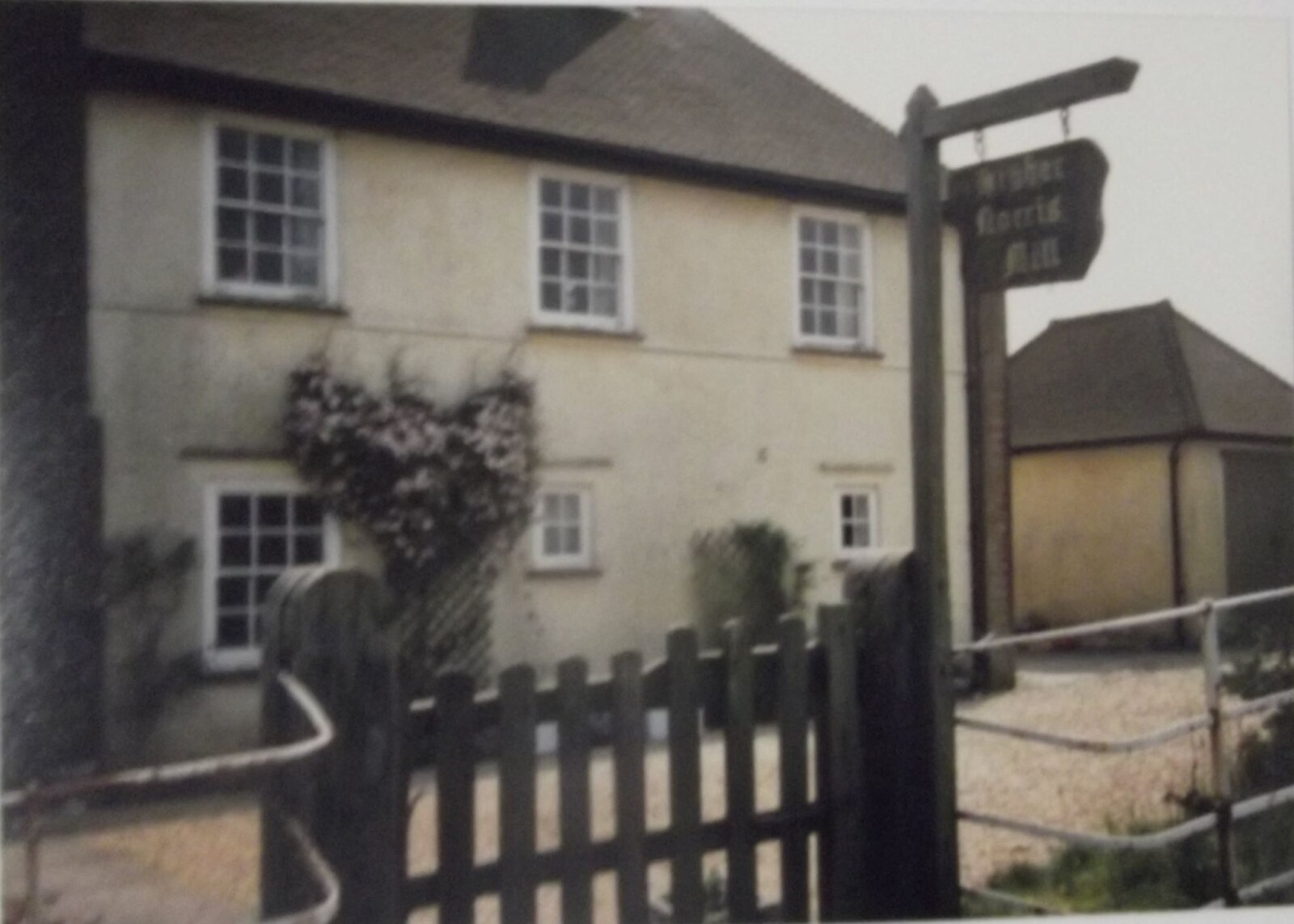
At the time you wanted to record your third album, but Roger (Hadden) had a breakdown? What was happening at the time? Are there any recordings left from it? (some of it appeared on later albums like Interesting Times)
That was a very sad time for all of us. Roger had been struggling with problems for a while, possibly due to LSD, and at some point, broke down completely. I remember we had driven to a gig somewhere, and we were ready to play, but Roger had broken down completely in the dressing room and was obviously in no condition to do anything. We had to cancel the gig and drive back home. None of us knew what to do, and we got back, Roger’s girlfriend took him to their room and we all went to bed. The next day was no better and over the coming weeks we realised that Roger needed medical help for his condition. Roger’s girlfriend decided that it would be best to take Roger back to London so that he could get proper help and diagnosis so they packed up and went. We talked for days about what to do, then we heard that Roger had been diagnosed with some kind of drug psychosis and would be going to a hospital near where his parents lived. That for us was the end of the band. We did not want to carry on without him so we prepared to leave Dorset and go back. There were some demo track we’d recorded in preparation for a third album and they appeared much later on various albums.
What happened after the band stopped?
We all went back to London and went our separate ways. Later Simon joined the Third Ear Band, which I also joined. That lasted for about a year. It was a very vague, period for us all. I think that was the last serious band I was in. I drifted around for quite some time, doing very little, then finally ended up going to do a degree at a London college where I did music, theatre, and literature. Very strange.
There are a couple of High Tide releases from the late 80s and 90s. Would you like to comment that?
The only recording I did was the Woronzow album with Tony, where I played on 3 or 4 tracks, and Ade played on the rest. It was great to play with Tony again and I think we still had the old rapport, so it was good fun. The only other time we played together was at a Bevis Frond gig in London sometime in the 90s. There was a pub they play at regularly, and Ade suggested that as Tony was coming to the gig possibly I could come down from Wales where I lived and we could do a High Tide number together. I thought that was a great idea so it was arranged that we would do one number, “Death Warmed Up”, with Nick Saloman on rhythm guitar and the Frond drummer. It wouldn’t be the same without Simon House on violin, but either he wasn’t around or he wouldn’t do it, I don’t know which. Anyway, rather nervously we came on stage, and to my surprise there were shouts of encouragement from the audience. Several High Tide fans had turned up when it was advertised that we would be there, so that was very unexpected. We blasted into “Death Warmed Up” and I think some of the old magic came through; the crowd were very enthusiastic when we finished, and a few came up to us afterwards and asked us to sign cds etc. A great evening. That was the last time I saw Tony Hill.
It’s absolutely impossible to cover your discography, but let’s at least try to go through it. In 1970 you worked with Denny Gerrard on Sinister Morning release, in 1975 you worked with Michael Moorcock & The Deep Fix on his The New Worlds Fair album. Then with Annette Peacock – X-Dreams (1978) and with Ronnie Paisley’s Band – Smoking Mirror (1978).
Yes, all those…. Denny was a friend of ours and when he decided to produce an album with his girlfriend, he asked us to play on it, which we did. It was kind of weird folk music so it was a bit outside our usual style, but it worked quite well. Simon had been working with Moorcock on New Worlds Fair and Moorcock had said he’d like a cello player. Simon mentioned that I played cello so I was asked to come along to the studio where I met Mike Moorcock. We got along very well, I played on one track, “Rolling In The Ruins”, and after the recording session, Mike invited me to his house and we became good friends and have remained so over the last 30 years. Annette was great fun, she seemed taken with my playing, don’t remember where, and she invited me to her recording session where I played on one track. She went back to the USA and I never saw her again. I later went on tour with Ronnie Paisley for a couple of weeks where I played cello with his band. I don’t remember too much about that except it was fun. I also played on one or two of the tracks on his album.
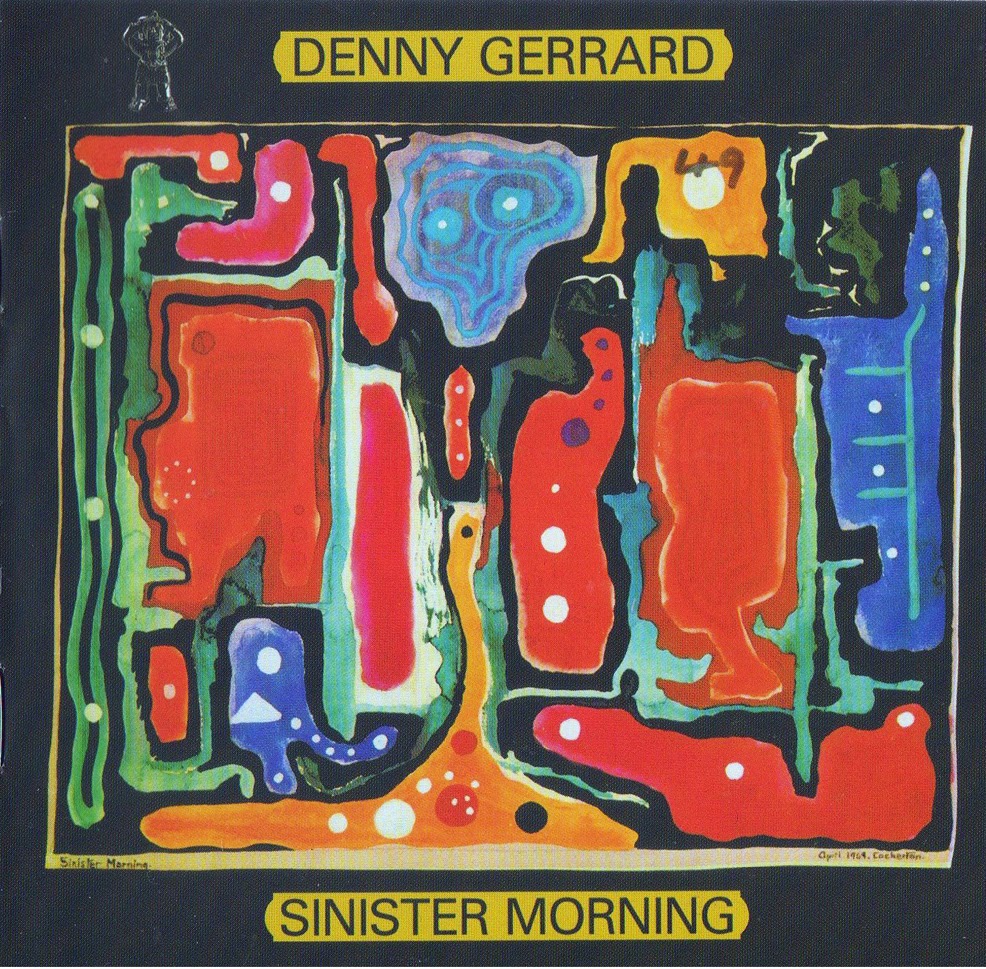
You also collaborated with Robert Calvert on his Hype release.
Robert Calvert was another person that I met through Simon. Again he was working with Robert and he asked Simon if he knew any cello players, so Simon got me in, I played on one track on Hype. After the session we went out for a drink and I became friends with Robert as we had similar music tastes. This was when we collaborated on the Revenge songs, then I did two stage shows with him, The Crankshaft Cabaret, and the electronic musical The Kid From Silicon Gulch which we collaborated on. We worked together quite closely on that, with Robert producing the synth lines and I played lead guitar and bass. It was great fun, but unfortunately, Robert was subject to mental health problems where he would fly into a terrible rage and become very aggressive. This happened at the end of Silicon Gulch and we fell out rather badly and I never worked with him again. He died not long after of a heart attack. A great shame, because he was a very talented man.
How about Hazchem project from the early 90s with Drachen Theaker?
Drachen was an old friend from when we lived in Dorset a mile from the Arthur Brown Band. I never worked with him then but when we all came back to London I used to go over to see him in his cluttered flat in Kings Cross. He was very interested in Indian music and had been learning to play table, the Indian drums. I was also interested in this kind of music and we started working on Anglo-Indian compositions. He’s made a drum kit using screwed together Indian drums, which sounded amazing. He was also working on a massive volume translating Indian drum rhythms into Western notation. He really was quite mad, but we got on very well and started producing weird compositions. He worked with a few other people, including Tony Hill. These sessions I was not involved in, but I do remember getting annoyed with Drachen because he’d started bringing his Indian girlfriend in (she was a classical Indian music vocalist), to sing over some of the tracks, with Drachen playing drums or table, and with Tony jamming on guitar. He was calling these albums High Tide, which they were very obviously not, even though Tony was playing on them. They were basically Indian music jam sessions. Avoid these. He was a one-man record industry, recording and putting out stuff from all over the place. He is another friend who died tragically in his 40s, closely followed by Andy Rickell. I still miss them both.
You also appeared on Rustic Hinge – Replicas.
These were recordings I’d done with Andy Rickell. We found that we had an astonishing rapport in improvisation. We could sit and play, usually two guitars, and be in perfect sync as we improvised. This was something Andy had found with Drachen when they recorded “Tea On The Lawn”, and I had the same musical telepathy. The one track I played on with both of them was the weird “Mastadon”. The other tracks were duets with Andy and myself. My one regret is that we never had a chance to form a proper band, the three of us. It would have been fantastic. I do remember a funny incident with Drachen. He used to have a regular gig at an Indian restaurant where he would play tabla with another musician while people had their meals. He would get paid and fed a plate of curry. One night his regular musician couldn’t make it and Drachen rang me and suggested that I accompany him with the cello. I had learnt two Indian pieces on the cello, and we would have to play for about two hours. I said that it might be difficult with my limited repertoire, Drachen said, don’t worry, we’ll improvise. So we met at the restaurant, started playing the first number for about ten minutes, then did the second number for another ten minutes. We then played the first number again, then the second. Then the first again then the second. By this time the waiters were walking by us looking surprised and not too happy. We came off stage for a break, then went back on with the same numbers. After about 20 minutes the manager appeared and motioned to us to stop playing and come off the small stage. Drachen then went off with him. He came back and said that he’d been fired and we had to leave. The manager had paid him half the money but we never had the free curry. Very funny. This sums Drachen up.
Some more collaboration with Michael Moorcock followed in the 90s and you also started to working with your long time friend Adrian Shaw on Tea For The Hydra.
The collaboration with Moorcock was a bit of a dead end except for one track which Flicknife Records produced called “The Brothel In Rosestrasse”. This came out as a limited edition of 50 copies. In fact, I didn’t actually work with Ade on his album, he just asked me to play bass on one track, which I did. I played viola on a couple of other tracks but that was for different releases. We never got around to properly working together, which was a shame. Maybe next year!
You also appeared on Spirits Burning release?
Yes, that was a very strange setup. The producer, Don Falcone used to get various musicians from around the world to work together on tracks which were sent round as wav files, and these would then be added to by whoever, I played bass, guitar and viola on various tracks.
In 2012 you released your solo album What.. What can you tell us about it?
This was brought about because Amazon had started something called CreateSpace, where you could upload your book, poetry, or music, produce a cover, and it would be released on Amazon, all free of charge. Amazon took a large chunk of the royalties if it sold, but I didn’t mind that. I had been recording short instrumental pieces on Cubase, mainly using synths with some electric guitar and bass, so I decided to put out my own album, for free, and design the cover etc. So that’s what I did. It was a selection of unrelated pieces, even though I called the second half Lift Music. I’ve been meaning to release another one called So, but haven’t quite got round to it. I have also published two collections of short stories on sale at Amazon, and a collection of poetry. Just for my own amusement.
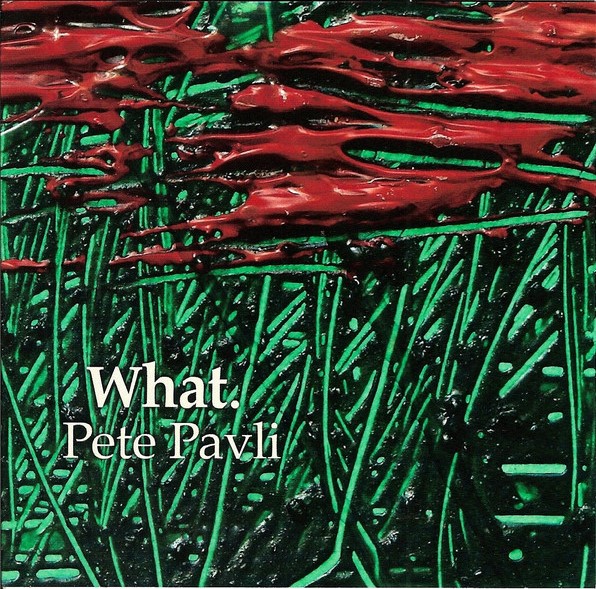
One of the most recent project is with Strata Florida. Falling From Grace was released in 2016.
About 8 years ago I was working with a local choir; I used to play bass and viola with them. One rehearsal I met one of the singers, a woman called Louise Trehy who I’d heard had been in a band in the early 90s called Swallow. We began talking and she told me about her music experience. She’d worked with her then boyfriend on some songs and they had come to the attention of a prominent label called 4AD, who were interested in signing them. Which they did, and they produced an album called Blow, which was well received and sold 30.000 copies. Unfortunately, by this time the two were not getting on well and eventually split. So that was the end of her music career. But she’d moved to Wales, and now, 20 years later, she’d started writing songs again. Because she didn’t play guitar very well she said she wanted someone to work with to put the songs together, would I be interested. She sent me a couple of the songs, and when I heard them I said yes immediately. They were the strangest sound I’d heard in a long time. So we started putting them together on Cubase, and after a couple of months we had three songs in quite a good state. We decided to put them on SoundCloud to see what the reaction was like. We immediately had messages saying beautiful, dreamy etc, and messages from old fans of Swallow. But also, we had an email from a small record label called Saint Marie, based in America, who wanted to sign us for an album. We were thrilled and worked hard to put ten songs in total together. Unfortunately we didn’t have the money for a studio so they were home recorded, rather lo-fi, and the mix was not good; the vocals were very indistinct. This was called Made of Stars. Anyway it went out and we had some good reviews and we sold a few hundred copies. At this point we were were working on a second album. Unfortunately, Louise had a falling out with the owner of Saint Marie and we left the label. We carried on regardless, finished a second album called Falling From Grace, and put it out on BandCamp. This also sold several hundred copies. And the vocals are a little more prominent. We are currently working on a single to bring out on either vinyl or cassette.
Is there still any unreleased material of High Tide?
Not that I know of.
Are you still in touch with other members of High Tide?
Occasionally I speak to Tony on the phone.
What currently occupies your life? Any future projects we should expect?
I’m very happy living here in Wales with Louise, my girlfriend. We are still making music, as I said, we hope to put out a single at some point. I’m also involved in art and craft, I make pottery at home and sell occasionally, and I enjoy writing; I’ve recently put out another book on Amazon called Coming Home, this one is poetry and prose. Who knows, the future is still wide open.
Thank you for taking your time. Last word is yours.
Thanks for allowing me to tell my story, and thanks to all the High Tide fans out there who still enjoy our music.
– Klemen Breznikar

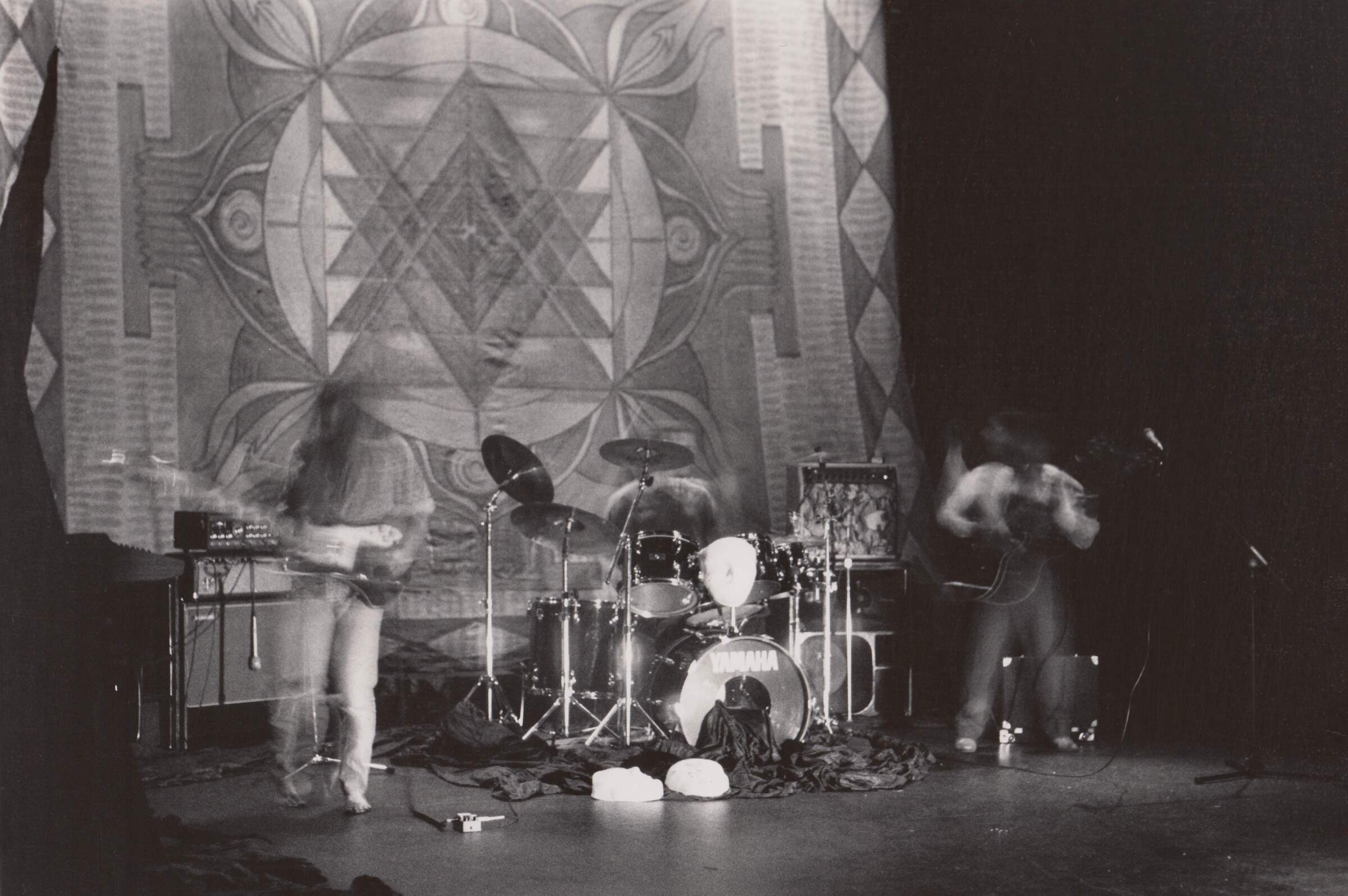
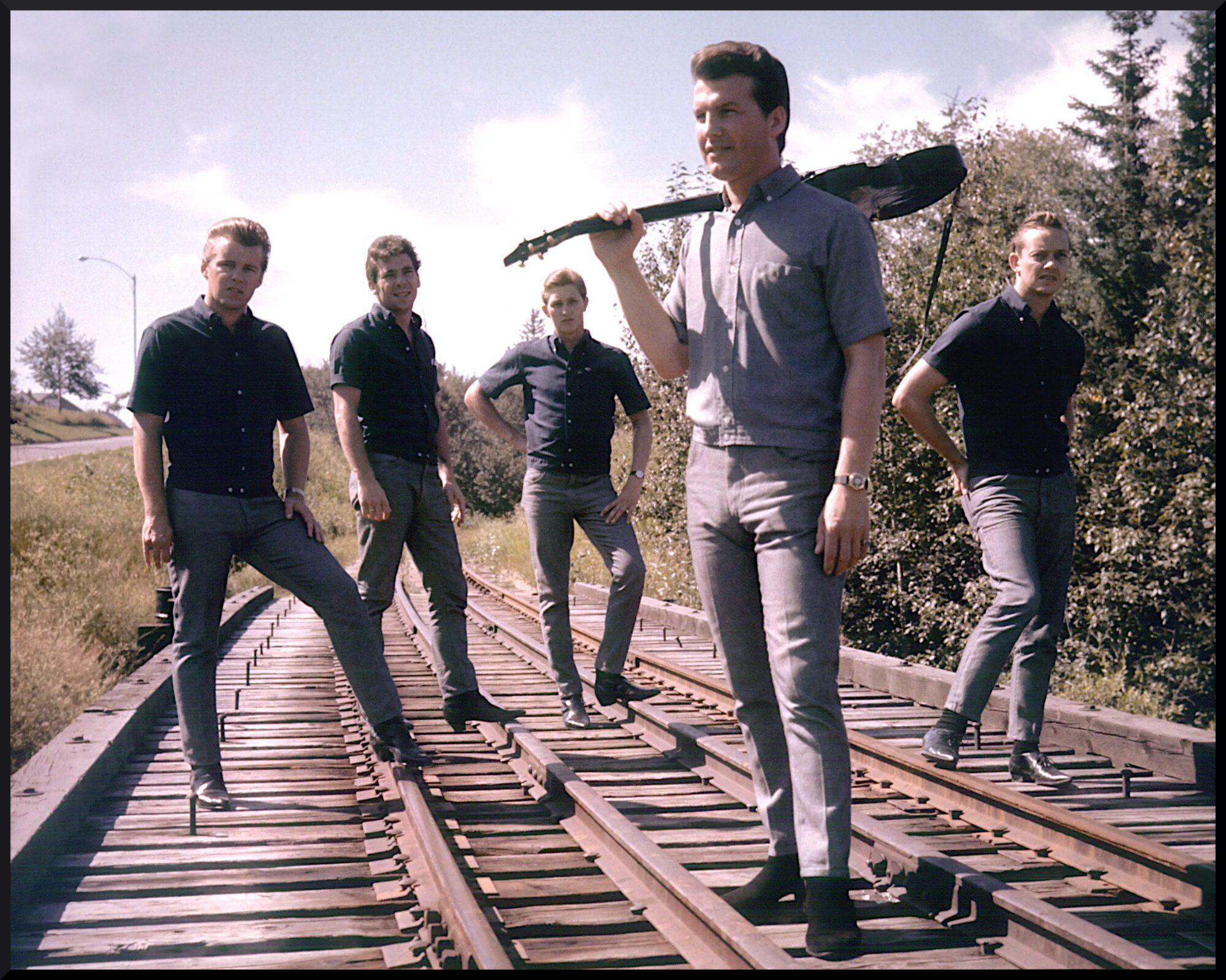
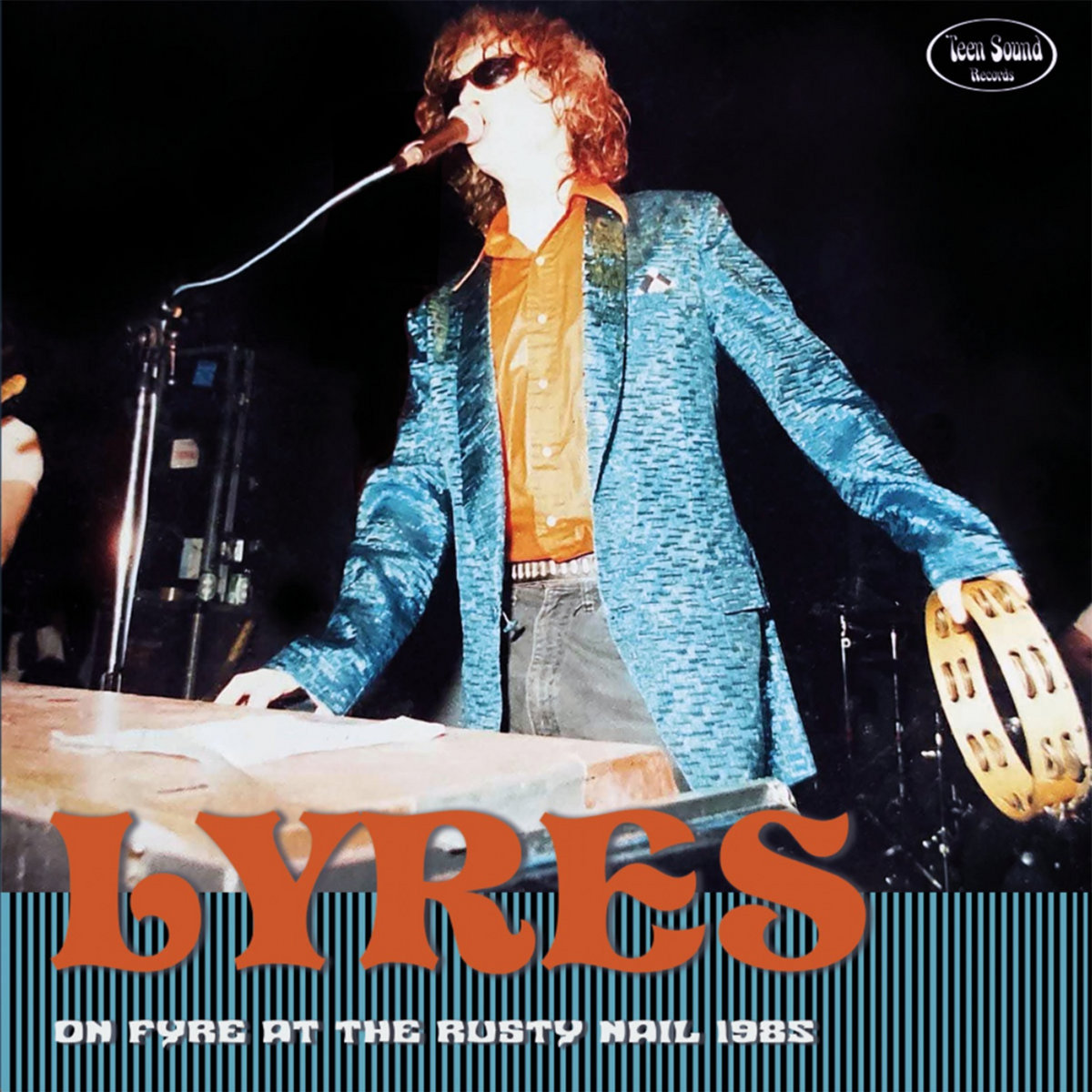
It’s nice to see the pioneering Prog band featured here. “Sea Shanties” is one of the finest recordings of the ’60s and one of the most powerful. Good to see Pavli have a rich music career after his time with the band.